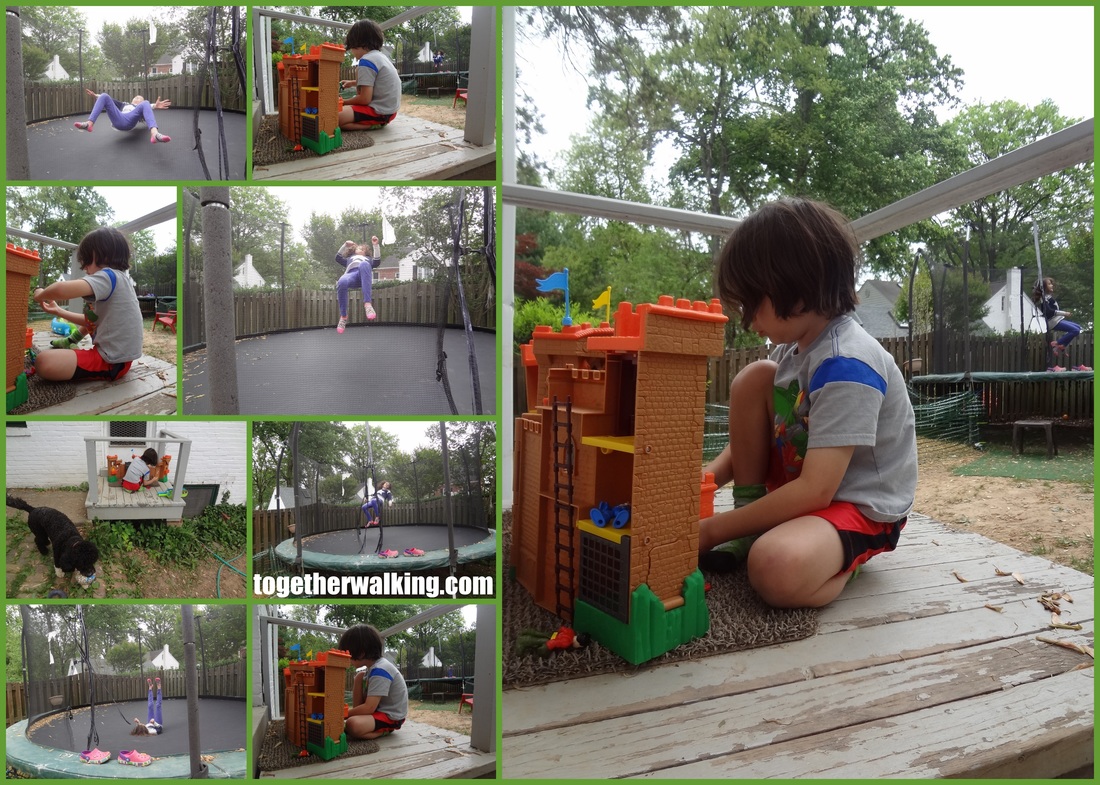|
The other day Marisol wanted to go on the trampoline. Normally as soon as she's ready, Gerry jumps at the chance (literally and figuratively! ha.) But in this instance he didn't want to right at that moment. He was busy playing with the awesome Eagle Talon Castle that his new friend let him borrow. The thing is - both kids want someone with them. They don't want to be alone. So if the other doesn't want to play with them, then they BOTH want ME. Since I haven't yet figured out how to be in two places at once, we were at an impasse. We discussed different options but neither wanted to wait on *their* particular plan/desire. Usually what I do in this cases is admit, "I don't know what to do!" I restate what they both want. I ask for their ideas too. That day, in a moment of inspiration I suggested that we bring the castle outside. Gerry agreed. Marisol happily bounced on the trampoline. Yoshi joyfully ran to find her ball. I was happy to be outside and finding a way to help everyone get what they want. This is what consensual living looks like in our house. The idea of consensual living is unfamiliar to most people in our culture. We are used to the ideas of voting and "majority rule". We see this kind of system as normal and "fair." Well, actually what we say to make people feel better when they don't get their way (you know, the minority) is that "Life isn't fair." But as the following passage from Mandela's Democracy indicates, the kind of mentality and "democracy" we're accustomed to can leave a very unhappy and disgruntled minority. He describes a different way (all bold emphases are mine): "It was democracy in its purest form. There may have been a hierarchy of importance among the speakers, but everyone was heard: chief and subject, warrior and medicine man, shopkeeper and farmer, landowner and labourer. People spoke without interruption, and the meetings lasted for many hours. The foundation of self-government was that all men were free to voice their opinions and were equal in their value as citizens. (Women, I am afraid, were deemed second-class citizens.)… At first, I was astonished at the vehemence—and candour—with which people criticized the regent. He was not above criticism—in fact, he was often the principal target of it. But no matter how serious the charge, the regent simply listened, not defending himself, showing no emotion at all. The meetings would continue until some kind of consensus was reached. They ended in unanimity or not at all. Unanimity, however, might be an agreement to disagree, to wait for a more propitious time to propose a solution. Democracy meant all men were to be heard, and a decision was taken together as a people. Majority rule was a foreign notion. A minority was not to be crushed by a majority. Only at the end of the meeting, as the sun was setting, would the regent speak. His purpose was to sum up what had been said and form some consensus among the diverse opinions. But no conclusion was forced on people who disagreed. If no agreement could be reached, another meeting would be held… As a leader, I have always followed the principles I first saw demonstrated by the regent at the Great Place. I have always endeavoured to listen to what each and every person in a discussion had to say before venturing my own opinion. Oftentimes, my own opinion will simply represent a consensus of what I heard in the discussion. I always remember the regent’s maxim: a leader, he said, is like a shepherd. He stays behind the flock, letting the most nimble go on ahead, whereupon the others follow, not realizing that all along they are being directed from behind." From Wikipedia: Consensual living is a philosophy derived from the principles of consensus decision-making which advocates a consent-based approach to conflict resolution. The process of finding solutions in this model usually includes the communication of individual needs and the brainstorming of possible solution which will successfully address the needs of all parties, based on finding a common preference. [1]CL adopts the democratic principle of equality by which the wants and needs of everyone involved are considered equally in the process of problem solving, regardless of an individual’s age or position. Because of this stance, CL is sometimes regarded as a parenting philosophy, where children are considered to have an equal say in family decision making. I have another story of a time when my family worked really well together to find a solution that worked. We were on vacation last September in Lake Norman, NC. It was the four of us, Yoshi, and my parents. Mike and I made plans to go into Charlotte to go to the NASCAR Hall of Fame. My parents would puppy sit Yoshi since we didn't want to leave her for too long in the crate. Well, we had told our kids about the Hall of Fame, but it hadn't been clear that Grandma and Grandpa weren't coming. Marisol was not happy with this plan. She really wanted to be with her Grandparents. But she did not want to stay home with them either. We were at an impasse. It would have been easy to get frustrated at this point and exasperated. We could have tried to force our way. But instead we listened and we talked. It took a bit of brainstorming and a few conversations between me and Mike, Marisol, and my parents, but we did come up with a solution that everyone was happy with! Mike, the kids, and I would leave first and go to the Hall of Fame while my parents stayed behind for a couple of hours with Yoshi. Then they would drive to Charlotte to meet us for dinner (at Dale Jr.'s restaurant, of course!) Ok, well I take it back. Yoshi probably wasn't THRILLED with this plan, but her needs were met adequately. I remember feeling so good that day because we were able to communicate and make a plan that everyone felt good about. How awesome is that? I remember that I had just read about Tribal cultures where they discuss until everyone agrees. The process can take a long time - and by that I mean days. I mentioned this to my parents and I'm pretty sure my Dad rolled his eyes a little bit and called me a hippy (or said I should live in Africa or some-such!) but I also know that they were happy too. It was a great moment and one I want to remember and replicate again in the future. This is what happens when we view our children as people worthy of our respect. When we are their partners we overcome obstacles together. It doesn't mean we don't have disagreements sometimes or that things are perfect, it just means that we don't pit ourselves against each other. And although it's not magic, it sometimes feels magical.
3 Comments
It's always good to hear from people who are living a similar lifestyle. My sons are teens and they grew up this same way. We do what we can so that everyone is as happy as can be. It used to be a lot of Dad and I giving in to how the boys wanted things to go but as they got older they have gotten amazingly good at compromising and still getting their needs met. It's been wonderful journey and I can't wait to see what kind of beautiful adults they will be.
Reply
Michelle,
Reply
You have a much better choice of words. That's exactly it. We are more flexible as adults and have a lot more patience to wait. As my kids got older, they had the patience and understanding as well. Leave a Reply. |
Susan MayWife, mom, information and peace seeker. Categories
All
Archives
November 2023
|



 RSS Feed
RSS Feed


